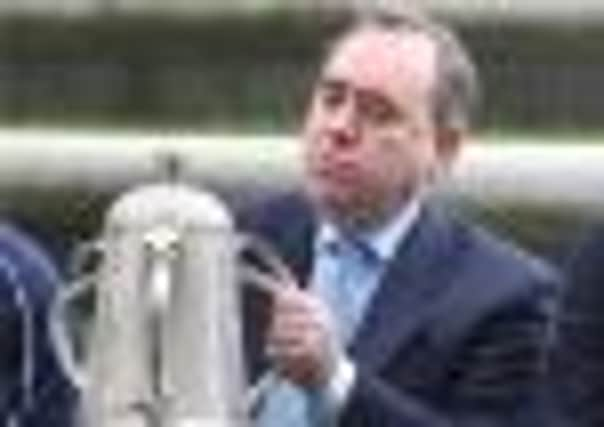BBC cite‘inappropriate setting’ for Alex Salmond’s Six Nations snub


The BBC said today that the match was “not an appropriate setting” to give a single political leader “that level of prominence.” It said leading politicians from other parties would not have had coverage “of appropriate prominence” in the run-up to local elections.
The decision had been described as “bonkers” by the SNP.
The broadcaster published a response in the complaints section of its website today after receiving complaints about its cancellation of an appearance from Mr Salmond during its coverage of the Scotland v England Calcutta Cup.
Advertisement
Hide AdAdvertisement
Hide AdIt said: “On this occasion, having been approached by the First Minister’s office, BBC Sport asked for advice and with the full agreement of both the head of TV sport and the director of BBC Scotland, the judgment was made that the Scotland-England match was not an appropriate setting in which to give one single political leader that level of prominence.
“The topicality of the current political debate over the future relationship of Scotland with the rest of the UK, and with England in particular, was one of the factors taken into account.”
It went on: “The key factor, in advising on such occasions, is the importance of ensuring that other political parties have the opportunity to receive coverage of appropriate prominence over a reasonable timescale. That timescale can be affected by the proximity of elections, when such appearances would certainly not normally be appropriate.
“Given the singularity and high profile of the Calcutta Cup match, as well as the fact that it is now less than two months away from the election period before local government elections throughout Scotland, it was clear that leading politicians from other parties in Scotland would not have been able to enjoy coverage of appropriate prominence in the circumstances.”
It said it was satisfied that the decision was consistent with similar editorial judgments which are regularly taken in relation to other political parties and other political leaders by programmes across the BBC.
Mr Salmond had been due to speak about rugby and give his predictions for the first three Six Nations matches on the sport show.
At the weekend he criticised the BBC’s decision not to include him in the coverage. He also sparked a row by using a term linked to officials in Nazi Germany to describe a BBC adviser, with opposition leaders calling on him to apologise.
In an interview with the Sunday Herald newspaper, Mr Salmond suggested BBC journalists are “in thrall to Downing Street” and likened it to “tin-pot dictatorships”.
Advertisement
Hide AdAdvertisement
Hide AdHe also described one of the corporation’s advisers as a Gauleiter, the term given to provincial governors in Germany under Hitler. It also means someone in authority who behaves in an overbearing manner.
At the time a spokesman for Mr Salmond said: “The First Minister was rightly referring to over-officious BBC officials and the real concerns about editorial decisions taken by BBC journalists being overruled by bureaucrats on political grounds.”
A Scottish Government spokeswoman said: “Ministers have real concerns about editorial decisions taken by BBC journalists for interviews with the First Minister about rugby being over-ruled by the BBC’s chief political adviser.
“The Scottish Government see that as unacceptable, and the First Minister will certainly be raising the issue with Lord Patten, chairman of the BBC Trust, at the meeting in Edinburgh on Thursday.
“One of the BBC’s excuses for this change of heart was the ‘political debate around Scotland’s future’ - which will be under way for the next two-and-a-half years.
“The question therefore has to be asked of the BBC - does this ban apply for this entire period, for example to David Cameron during the London Olympics this year?
“As Scotland’s national broadcaster, these are serious questions which raise important issues about the BBC’s coverage of the referendum - which must be fair, impartial and consistent to all participants, and at all times.”